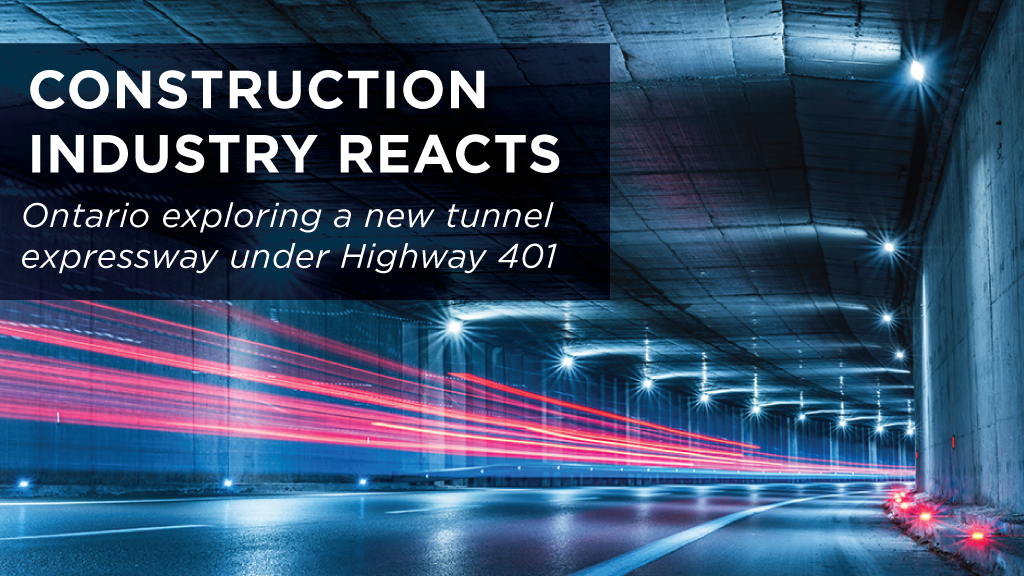The Government of Ontario announced it is exploring the feasibility of constructing a new tunnel expressway under Highway 401 and it’s raising a few eyebrows, with construction industry stakeholders generally supportive of the idea, but with a few caveats.
While there has been some criticism around the proposal, stakeholders pointed out tunnels have been used in other jurisdictions.
“A lot of the feedback is this is never going to get built or this isn’t going to be built for years and years,” said Victoria Mancinelli, director of public relations with the Labourers’ International Union of North America (LIUNA). “I think we have to be proactive, not reactive when we’re talking about our infrastructure because Ontario is growing rapidly. Growing regions require resilient infrastructure. We need bold action. We need leadership and we need the foresight to think not just about the infrastructure of today but in 10 years from now as well.”
The LIUNA Local 183 Training Centre has the first and only tunnel and rescue facility of its kind in North America where members are trained. Tunnelling is LIUNA’s jurisdiction and members would be involved in performing the work.
“LIUNA Local 183 represents 70,000 members in the GTA and they are currently working on almost every transit infrastructure underway, so they will play a vital role in getting the 401 tunnelled, working alongside many other trades as well,” said Mancinelli.
Many U.S. cities such as New York, Boston, Chicago, Miami tunnel or double deck their highways to create more capacity, Raly Chakarova, executive director of the Toronto Area Road Builders Association (TARBA), told the Daily Commercial News.
“Using existing space and going under it eliminates the need to expropriate additional land. It may cause less disruption to existing traffic flows during construction but it does create a number of other engineering and design difficulties which I’m sure will come up as part of the process,” she said.
Premier Doug Ford announced the launch of the feasibility study Sept. 25.
“This tunnel would serve as a new expressway for both cars and transit from Brampton and Mississauga in the west, to Markham and Scarborough in the east, connecting with major roads and highways along the way,” Ford explained in the announcement.
Current infrastructure projects ‘can’t lose momentum’
Chakarova said TARBA and its members want to provide input during the evaluation process.
“The next step for us would be connecting with our members and with MTO (Ministry of Transportation) and Infrastructure Ontario staff to start those conversations around the early works that will probably include soil testing and looking at the information that we do have to see if it’s possible,” she said.
It’s important that moving forward this project doesn’t take away from ongoing infrastructure priorities the government has committed to.
“An ambitious project like that cannot really deter from the existing project pipeline, which also has a lot of ambitious projects when you think about Highway 413, Bradford Bypass, the Ontario Line and the housing enabling infrastructure,” said Chakarova. “These are all major projects that we can’t lose momentum on because they’re also critical in expanding that transportation capacity as well as addressing housing shortages.”
The Ontario Sewer and Watermain Construction Association (OSWCA) said investments to rehabilitate and expand much-needed water and wastewater infrastructure are also critical.
“For decades, we have neglected building the critical transportation and highway infrastructure needed to address Ontario’s growing population,” said Stephanie Bellotto, manager of government relations with OSWCA, in a statement. “We are pleased to see that the Ford government has a bold vision for tackling traffic congestion, which is already costing the GTHA $11 billion per year in lost economic opportunity and is continuing to deliver on critical infrastructure projects.”
Feasibility study will evaluate cost and length of tunnel
Engineering services for the tunnel will be secured through the Ministry of Transportation with support from Infrastructure Ontario.
The feasibility work will include examining various options to increase Highway 401 capacity, including potential routes within the existing right-of-way, number of lanes, length and the number and design of interchanges connecting to other highways.
It will also include refining the province’s understanding of the proposed tunnel’s economic contributions as well as the project’s impact on reducing gridlock; reviewing best practices from similar projects in other jurisdictions; conducting initial soil boring testing to improve the province’s understanding of the route’s geology and its impact on design and construction; preparing to start the environmental assessment processes; and conducting an initial market sounding, with feedback informing any potential procurement and commercial structuring strategies.
Nadia Todorova, executive director with the Residential and Civil Construction Alliance of Ontario, said the project represents an “innovative” approach to transportation infrastructure.
“We are committed to supporting the government through the extensive knowledge and experience that our members have and offering advice however we can because it’s going to be a big undertaking,” Todorova stated. “Our members are familiar with that stretch of the road. They understand the complexities and what is required.”
Transport Futures founder Martin Collier said implementing a comprehensive policy mix of telecommuting, mobility pricing and complete streets would go further, faster than a multibillion-dollar tunnel that causes traffic delays during construction, will have many engineering hurdles and ultimately induces more travel.
“If Premier Ford is serious about decreasing congestion and saving Ontarians travel time today, he should focus on optimizing the existing road network rather than expanding certain sections of it,” he said.
The Ontario Road Builders’ Association (ORBA) called the government’s decision to explore the construction of a tunnel under Highway 401 “bold” and “forward-thinking.”
“The exploration of a tunnel under this key corridor demonstrates the government’s recognition of the urgency to expand Ontario’s roads and highway network in response to a growing population, economic pressures and to enable much-needed housing development,” states the release.
“ORBA has long advocated for common-sense solutions to fighting gridlock centered on building new roads and highways, in conjunction with public transit.”










Recent Comments
comments for this post are closed